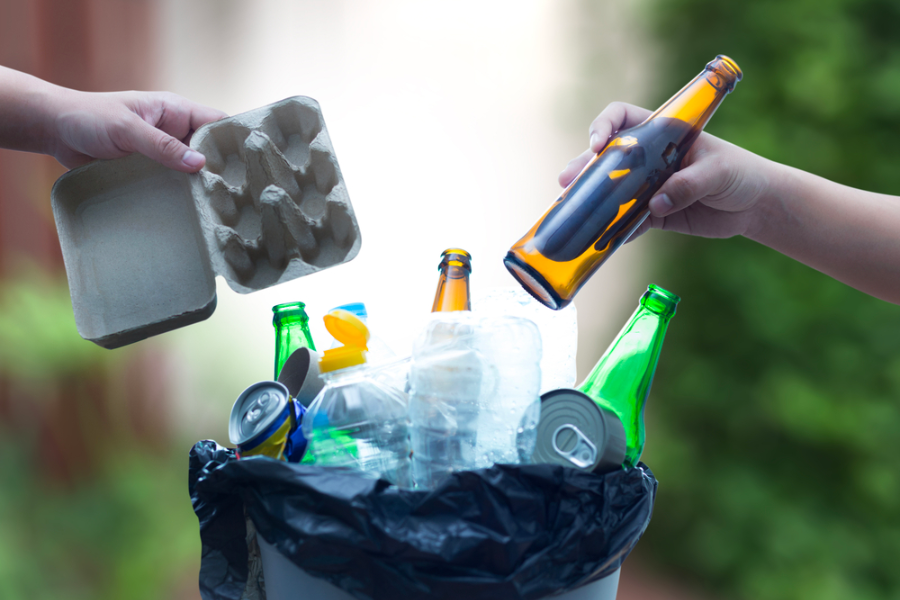NERC's 2023 Fall Conference - A Resourceful Future for Sustainable Materials Management
The Northeast Recycling Council’s (NERC) 2023 Fall Conference—A Resourceful Future for Sustainable Materials Management—offers attendees a multitude of opportunities for engaging in critical discussions with colleagues and promote circular economy practices while hearing from noteworthy speakers, panelists, and exhibiters. The Conference topics include Extended Producer Responsibility (EPR), Recycling Market Development, Recycling Media Literacy, Recycling and Composting in Environmental Justice (EJ) Communities, and Policies to Support Organics Programs. The one-and-a-half-day Conference will be held in-person on November 1-2 at the Hotel Providence in Providence, Rhode Island.
Brett Smiley, Mayor of Providence will kick off the Conference with welcoming remarks and the keynote address, Incentives for Eco-design in Extended Producer Responsibility Programs, will be given by Reid Lifset, a Research Scholar and Resident Fellow in Industrial Ecology from Yale University. Following the opening remarks, four presenters will provide updates on existing packaging EPR laws in four states: Darla Arians, EPR Program Lead at Colorado Department of Public Health and Environment; Jessica Nadeau, Environmental Specialist at Maine Department of Environmental Protection; Karen Kayfetz, Branch Chief, Product Stewardship Branch, of CalRecycle; and Rachel Perlman, a Consultant at Resource Recycling Systems. The following session will discuss EPR for Hard to Recycle Materials, specifically focusing on used electronics, batteries, and household hazardous waste. Naomi Manahan, a Senior Operations Program Manager from Reverse Logistics Group, will cover Illinois & South Carolina's Electronic Stewardship Legislation, and staff from the District of Columbia’s Department of Energy and Environment will detail DC's Battery Producer Responsibility Law. Wrapping up the EPR discussion, Josh Kelly, Solid Waste Program Manager at Vermont's Agency of Natural Resources, will describe the Household Hazardous Waste EPR Program.
The second half of the day will feature three presenters on the New Approaches to Recycling Market Development session. Kate Walker, Executive Director of SUNY Center for Sustainable Materials Management, will speak about Partnerships for Zero Waste Projects in New York State. Sean Sylver, Recycle Planner at the Massachusetts Department of Environmental Protection, will speak about using a Diverse Stakeholder Recycling Market Development Workgroup for State Planning. Ross Bergman, GreenBlue Institute's Director of Recycled Material Standard, will present on Attributes of Recycled Content Certificates for New Revenue Streams and More Resilient Markets.
Concluding the first day will be a four-person panel on Media Literacy as It Pertains to Recycling. Gretchen Carey, Sustainability Manager of New England Region, Republic Services, and President of Mass Recycle, will lead a discussion on Creating and Sharing the Story. Dan Green, CEO of Helpsy, will speak about Increasing Awareness and Dispelling Myths About Textile Recycling. A Communication Strategies and Key Messaging discussion will be offered by Oregon Metro’s Program Manager, Jill Hrycyk. Finally, JoAnn Gemenden, Executive Director of New Jersey Clean Communities, will lead a conversation on using a Digital Platform for Increasing Recycling Rates.
Day Two will begin with a presentation on Scaling New Recycling & Composting Programs in Environmental Justice Communities by Chris Gaynor, Climate Justice Specialist with the Rhode Island Department of Environmental Management; and Amelia Rose, the Executive Director of Groundwork Rhode Island. The final topic, Policies and Regulations to Encourage Organics Programs, will be discussed by a panel of professionals. The Center for Ecotechnology’s Heather Billings will focus on Assessing Food Waste Policies. The topic of Pivoting Organics Diversion Messaging to a Rodent Control Measure will be covered by Michael Orr, Recycling Director of the City of Cambridge Massachusetts Department of Public Works. The third panelist, Shannon McDonald, Natural Resource Planner at Maryland Department of the Environment will cover Creating Sustainable and Equitable Programs.
The Conference Agenda provides greater details about the sessions and schedule.
At the Conference, NERC will also premiere the Emerging Professionals Program, designed to foster the growth and development of new talent in the field of sustainable materials management. The Program gives organizations the opportunity to sponsor their newest employees or interns to attend the conference at a reduced rate, network with colleagues, and hear from and make connections with industry experts and seasoned professionals.
We would like to thank the Conference sponsors. They include Recycle Coach, Networking Reception sponsor; The Association of Plastic Recyclers and Republic Services, Silver Sponsors; and Carton Council, the Environmental Research & Education Foundation, and PaintCare, Bronze Sponsors. Finally, our Supporting Sponsors are American Recycler, Recycling Today, Resource Recycling, and WasteAdvantage magazine.
Share Post





